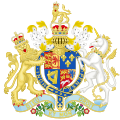| Ambassador of Great Britain to Portugal | |
|---|---|
 Arms of Great Britain | |
| Style | His Excellency |
| Residence | Lisbon |
| Appointer | The monarch |
| Inaugural holder | Sir Paul Methuen First Ambassador of Great Britain to Portugal |
| Final holder | John Hookham Frere Last Ambassador of Great Britain to Portugal (Chargé d'Affaires) |
The ambassador of Great Britain to Portugal was the foremost diplomatic representative in Portugal of the Kingdom of Great Britain, created by the Treaty of Union in 1707, in charge of the British diplomatic mission.
For ambassadors from the Court of St James's to Portugal before 1707, see the list of ambassadors of the Kingdom of England to Portugal. For ambassadors after 1800, see the list of ambassadors from the United Kingdom to Portugal.